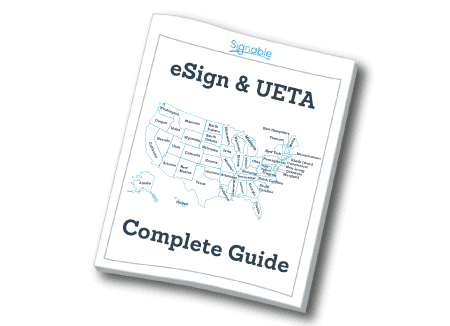Electronic signatures in Washington
Are electronic signatures legally binding in Washington?
Simply, yes.
Washington joined the majority of the US in passing the UETA act for the regulation of electronic signing and electronic transactions in 2020.
Before the ESIGN and UETA acts in 2000, Washington was one of the first states to implement their own electronic signature legislation. In 1997, the Washington Electronic Authentication Act or WEAA was made, albeit with a much narrower focus than the ESIGN act. The WEAA only recognised ‘digital signatures’, which require digital certificates to prove signers’ identities. But, from July 2019, this state law, the WEAA, was repealed completely from being defunct, as esignatures are used across the US without needing specific state-regulated digital certificates for signer identities.
The ESIGN act is a federal law to use for interstate and foreign commerce. So, it applies to the whole of the United States, overriding state and local laws. The ESIGN act is what now applies to Washington state. As of 11th June 2020, the UETA act has been adopted by Washington State Legislature too.
What are the eSign & UETA Acts?
In the ESIGN and UETA acts, there are four major requirements for an electronic signature to be recognized as legal under U.S. law. The eSign act is known as federal law.
The UETA & eSign requirements for Washington are:
1) Intent to Sign
No different than a wet signature, e-signatures are only considered valid if a user demonstrates a clear intent to sign, which Signable provides.
2) Consent to do business electronically
There must be expressed or implied consent from the signing parties to do business electronically. Signers also have the option to opt-out.
3) Clear signature association
Signable provides a clear and detailed audit trail that provides clear signature association once everyone has signed a document.
Everyone involved receives an email that includes the completed electronic document attached as a PDF and a certificate of signature.
The certificate of signature is an important document that includes important information including:
- Who each signing party is
- Dates, time stamps, IP addresses and fingerprints
- A full audit log or audit trail
4) Record retention
E-signature records are only valid as long as they can be reproduced if required. Signable provides a signed copy via PDF and allows parties to download the document when required.
Signable provides all of the above, meaning that you can trust your documents will be legally binding in the US.
It’s worth noting that in the US electronic signatures and digital signatures are both popular and we provide e-signature services.
You can find out more about the difference between an electronic signature and a digital signature here.
What documents can’t be signed under these laws?
We’ll include a link to the full list of documents that are currently not available for electronic signing in the US. But, to name a few:
- Documents relating to adoption, divorce and other family law matters
- Some types of real estate transfer documents and other real estate agreements
- Court orders, notices, and other court documents like pleadings and motions
- Some types of powers of attorney
- Wills, codicils, and testamentary trusts
- It’s also worth noting that last year the Uniform Law Commission declared eSignatures legal for wills BUT only in some states, so follow the link included below to see if will eSignatures are legal your state.
To read about the changes to wills, codicil and testamentary trusts, check out our blog.
Start sending documents, free
Experience Signable for yourself with a free 14 day trial
